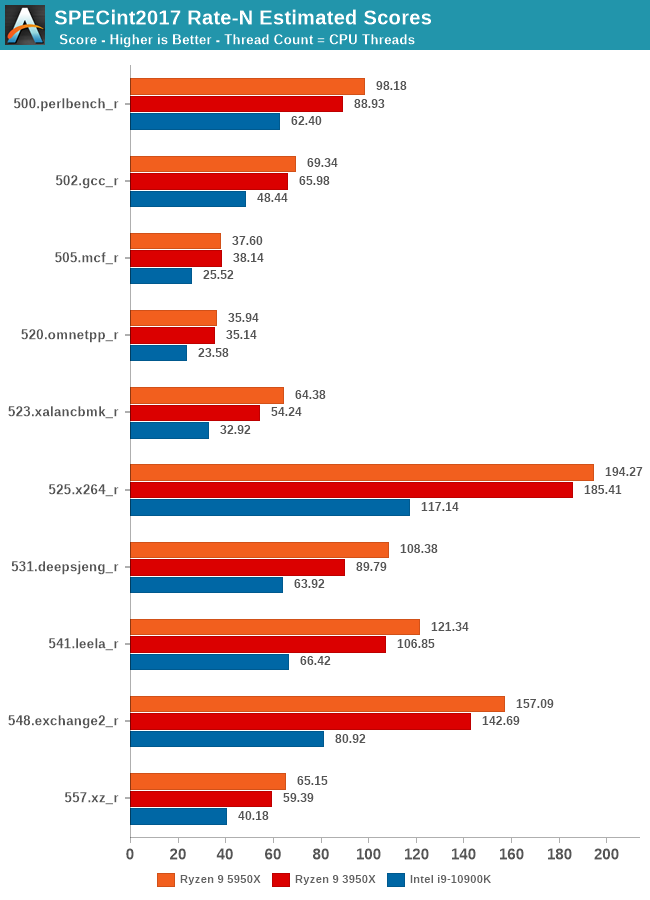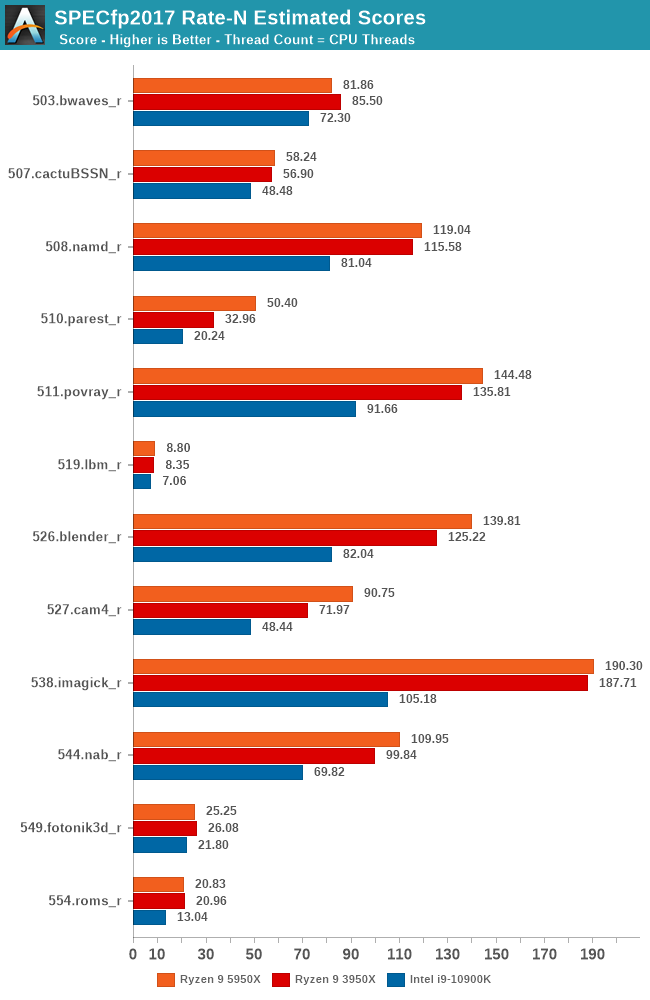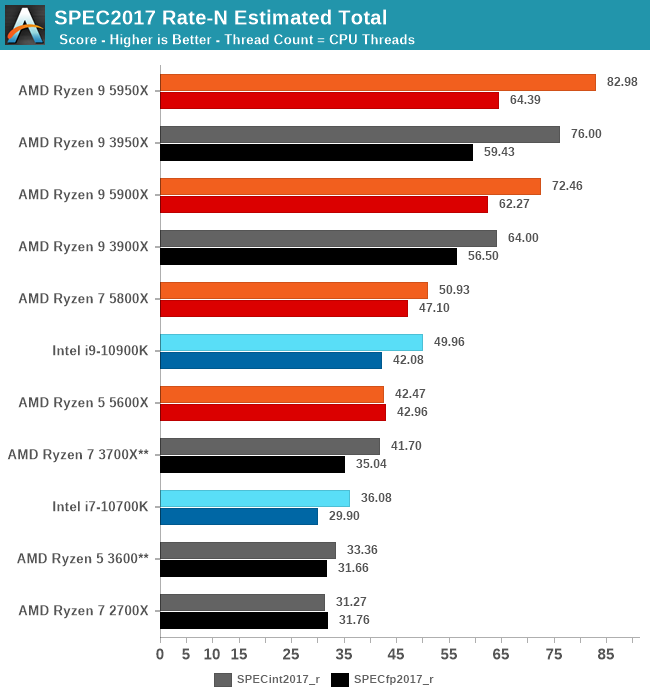AMD Zen 3 Ryzen Deep Dive Review: 5950X, 5900X, 5800X and 5600X Tested
by Dr. Ian Cutress on November 5, 2020 9:01 AM ESTSection by Andrei Frumusanu
CPU MT Performance: SPEC 2017
Whilst single-threaded performance of Zen3 seems to be an absolute win for the new Ryzen 5000 series CPUs, multi-threaded performance is also the other important aspect of a design. Generally, what comes into play much more for multi-threaded performance is the power efficiency of the design. As none of the current x86 consumer or enterprise parts are able to actually run all their cores at maximum frequency for peak performance due to platform power limitations, any resulting performance boost we might see between generations with a similar power cap will be due to power and energy efficiency gains between the designs.
For AMD, we’re limiting the detailed comparisons here to the 3950X and the 5950X which both have a PPT of 142W, which means that’s the maximum peak power for the platform, and observed 120-125W sustained figures in actual workloads. We’re also throwing in a 10900K for context, but given the very different core count numbers it doesn’t serve an exact apples-to-apples comparison.

Starting off with SPECint2006, the performance uplifts for the new Ryzen 5000 series here doesn’t seem to be all that significant in most tests, with uplifts well below those of the single-thread benchmarks.
Most of the tests are showing a 10% performance uplift, with the more memory heavy test showing no improvement. Some of the minor uplifts such as a 5% boost in 502.gcc seem quite disappointing and showcase that the new platform isn’t all that big of a boost for productivity workloads.

In SPECfp2017, 510.parest and 527.cam4 stand out as the two workloads with the biggest improvements, with the rest of the workloads all either having sub-5% improvements, or even just flat or slower performance than the 3950X.

** Preliminary figures to be re-tested due to 2x16GB SR vs 4x8GB SR memory DIMM configuration, scores will improve.
Overall, the new Ryzen 5000 series are showcasing a quite conservative 8-9% performance improvement over their predecessor generation SKUs. The 12-core variant here is showing a little bigger boost of 10-13%.
In this regard, the new chips seem to have missed the mark in terms of AMD’s claims for 12% better performance per watt for the new 5950X, and 26% better performance per watt for the 5900X – their marketing should have done better in explaining those figures, or just be more conservative with their numbers. This also doesn’t bode too well for the eventual EPYC-based Zen3 Milan chips.










339 Comments
View All Comments
jakky567 - Tuesday, November 24, 2020 - link
Total system, I think the 5950x should be more popular. That being said, the 5900x is still great.mdriftmeyer - Monday, November 9, 2020 - link
I spend $100 or more per week on extra necessities from Costco. Your price hike concerns are laughable.bananaforscale - Monday, November 9, 2020 - link
5900X has good binning and the cheapest price per core. For productivity 3900X has *nothing* on 5900X for the 10% price difference and 5950X is disproportionately more expensive. Zen and Zen+ are not an option if you want high IPC, 3300X basically doesn't exist... I'll give you that 3600 makes more sense to most people than 5600X, it's not that much faster.Kangal - Wednesday, November 11, 2020 - link
"Price per Core".... yeah, that's a pointless metric.What you need to focus on is "Price per Performance", and this should be divided into two segments: Gaming Performance, Productivity Performance. You shouldn't be running productivity tools whilst gaming for plenty of reasons (game crashes, tool errors, attention span, etc etc). The best use case for a "mixed/hybrid" would be Twitch Gaming, that's still a niche case.... but that's where the 5800X and 5900X makes sense.
Now, I don't know what productivity programs you would use, nor would I know which games you would play, or if you plan on becoming a twitcher. So for your personal needs, you would have to figure that out yourself. Things like memory configurations and storage can have big impacts on productivity. Whereas for Gaming the biggest factor is which GPU you use.
What I'm grasping at is the differences should/will decrease for most real-world scenarios, as there is something known as GPU scaling and being limited or having bottlenecks. For instance, RTX 2070-Super owners would target 1440p, and not 1080p. Or RTX 3090 owners would target 4K, and not for 1440p. And GTX 1650 owners would target 1080p, they wouldn't strive for 4K or 1440p.
For instance, if you combine a 5600X with a Ultra-1440p-card, and compare the performance to a 3600X, the differences will diminish significantly. And at Ultra/4K both would be entirely GPU limited, so no difference. So if you compare a 5800X to a 3900X, the 3900X would come cheaper/same price but offer notably better productivity performance. And when it comes to gaming they would be equal/very similar when you're (most likely) GPU limited. That scenario applies to most consumers. However, there are outliers or niche people, who want to use a RTX 3090 to run CS GO at 1080p-Low Settings so they can get the maximum frames possible. This article alludes to what I have mentioned. But for more details, I would recommend people watch HardwareUnboxed video from YouTube, and see Steve's tests and hear his conclusions.
Whereas here is my recommendation for the smart buyer, do not buy the 5600X or 5800X or 5900X. Wait a couple months and buy then. For Pure Gaming, get the r5-5600 which should have similar gaming performance but come in at around USD $220. For Productivity, get the r7-5700 which should have similar performance to the 5800X but come in at around USD $360. For the absolute best performance, buy the r9-5950x now don't wait. And what about Twitch Streamers? Well, if you're serious then build one Gaming PC, and a second Streaming PC, as this would allow your game to run fast, and your stream to flow fluidly.... IF YOU HAVE A GOOD INTERNET CONNECTION (Latency, Upload, Download).
lwatcdr - Monday, November 9, 2020 - link
"You can get the 3700 for much cheaper than the 5800X. Or for the same price you can get the 3900X instead."And if you want both gaming and productivity? They get the 5800X or 5900X. So AMD has something for every segment which is great.
TheinsanegamerN - Thursday, November 12, 2020 - link
The 5900x is margin of error from the 5950x in games, still shows a small uptick in gaming compared to 5800/5600x, offers far better performance then 5600/5800x in productivity tasks, and is noticeably cheaper then the 5950x.How on earth is that a non buy?
The rest may be better value for money, but by that metric a $2 pentium D 945 is still far better value for money depending on the task. The 5000 series consistently outperforms the 3000 series, offring 20% better performance for 10% better cash.
Kishoreshack - Saturday, November 14, 2020 - link
AMD has the best products to offerSoo you expect them to sell it at a cheaper rate than intel ?
Threska - Monday, November 16, 2020 - link
AMD has a good product RANGE, which means something for everyone AND all monies go to AMD regardless of consumer choice.Ninjawithagun - Friday, November 20, 2020 - link
The price hike is mainly to cover ongoing R&D for the next-gen Ryzen Zen 4 CPUs due out in 2022. The race between Intel and AMD must go on!jakky567 - Monday, November 23, 2020 - link
I disagree about the 5900x being a no buy.I feel like it goes 5950x for absolute performance. 5900x for high tier performance on a budget. And then the 3000 series for people on a budget, except the 3950x.
The 5900x has all the l3 cache.